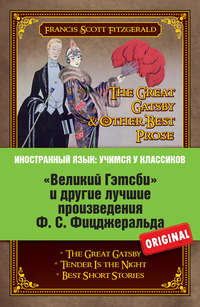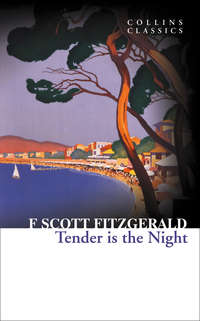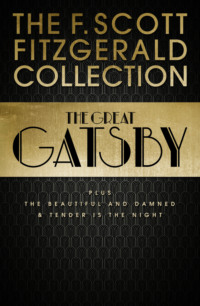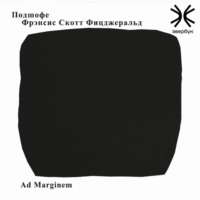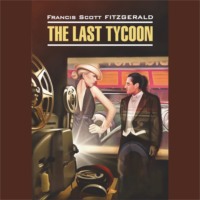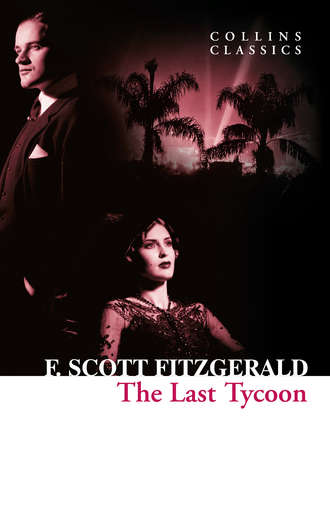
Полная версия
The Last Tycoon
There is never a time when a studio is absolutely quiet. There is always a night shift of technicians in the laboratories and dubbing rooms and people on the maintenance staff dropping in at the commissary. But the sounds are all different—the padded hush of tires, the quiet tick of a motor running idle, the naked cry of a soprano singing into a nightbound microphone. Around a corner I came upon a man in rubber boots washing down a car in a wonderful white light—a fountain among the dead industrial shadows. I slowed up as I saw Mr. Marcus being hoisted into his car in front of the administration building, because he took so long to say anything, even good night—and while I waited I realized that the soprano was singing, Come, come, I love you only over and over; I remember this because she kept singing the same line during the earthquake. That didn’t come for five minutes yet.
Father’s offices were in the old building with the long balconies and iron rails with their suggestion of a perpetual tightrope. Father was on the second floor, with Stahr on one side and Mr. Marcus on the other—this evening there were lights all along the row. My stomach dipped a little at the proximity to Stahr, but that was in pretty good control now—I’d seen him only once in the month I’d been home.
There were a lot of strange things about Father’s office, but I’ll make it brief. In the outer part were three poker-faced secretaries who had sat there like witches ever since I could remember—Birdy Peters, Maude something, and Rosemary Schmiel; I don’t know whether this was her name, but she was the dean of the trio, so to speak, and under her desk was the kick-lock that admitted you to Father’s throne room. All three of the secretaries were passionate capitalists, and Birdy had invented the rule that if typists were seen eating together more than once in a single week, they were hauled up on the carpet. At that time the studios feared mob rule.
I went on in. Nowadays all chief executives have huge drawing rooms, but my father’s was the first. It was also the first to have one-way glass in the big French windows, and I’ve heard a story about a trap in the floor that would drop unpleasant visitors to an oubliette below, but believe it to be an invention. There was a big painting of Will Rogers, hung conspicuously and intended, I think, to suggest Father’s essential kinship with Hollywood’s St. Francis; there was a signed photograph of Minna Davis, Stahr’s dead wife, and photos of other studio celebrities and big chalk drawings of mother and me. Tonight the one-way French windows were open and a big moon, rosy-gold with a haze around, was wedged helpless in one of them. Father and Jacques La Borwitz and Rosemary Schmiel were down at the end around a big circular desk.
What did Father look like? I couldn’t describe him except for once in New York when I met him where I didn’t expect to; I was aware of a bulky, middle-aged man who looked a little ashamed of himself, and I wished he’d move on—and then I saw he was Father. Afterward I was shocked at my impression. Father can be very magnetic—he has a tough jaw and an Irish smile.
But as for Jacques La Borwitz, I shall spare you. Let me just say he was an assistant producer, which is something like a commissar, and let it go at that. Where Stahr picked up such mental cadavers or had them forced upon him—or especially how he got any use out of them—has always amazed me, as it amazed everyone fresh from the East who slapped up against them. Jacques La Borwitz had his points, no doubt, but so have the sub-microscopic protozoa, so has a dog prowling for a bitch and a bone. Jacques La—oh my!
From their expressions I was sure they had been talking about Stahr. Stahr had ordered something or forbidden something, or defied Father or junked one of La Borwitz’ pictures or something catastrophic, and they were sitting there in protest at night in a community of rebellion and helplessness. Rosemary Schmiel sat pad in hand, as if ready to write down their dejection.
“I’m to drive you home dead or alive,” I told Father. “All those birthday presents rotting away in their packages!”
“A birthday!” cried Jacques in a flurry of apology. “How old? I didn’t know.”
“Forty-three,” said Father distinctly.
He was older than that—four years—and Jacques knew it; I saw him note it down in his account book to use some time. Out here these account books are carried open in the hand. One can see the entries being made without recourse to lip-reading, and Rosemary Schmiel was compelled in emulation to make a mark on her pad. As she rubbed it out, the earth quaked under us.
We didn’t get the full shock like at Long Beach, where the upper stories of shops were spewed into the streets and small hotels drifted out to sea—but for a full minute our bowels were one with the bowels of the earth—like some nightmare attempt to attach our navel cords again and jerk us back to the womb of creation.
Mother’s picture fell off the wall, revealing a small safe—Rosemary and I grabbed frantically for each other and did a strange screaming waltz across the room. Jacques fainted or at least disappeared and Father clung to his desk and shouted, “Are you all right?” Outside the window the singer came to the climax of I love you only, held it a moment and then, I swear, started it all over. Or maybe they were playing it back to her from the recording machine.
The room stood still, shimmying a little. We made our way to the door, suddenly including Jacques, who had reappeared, and tottered out dizzily through the anteroom on to the iron balcony. Almost all the lights were out, and from here and there we could hear cries and calls. Momentarily we stood waiting for a second shock—then, as with a common impulse, we went into Stahr’s entry and through to his office.
The office was big, but not as big as Father’s. Stahr sat on the side of his couch rubbing his eyes. When the quake came he had been asleep, and he wasn’t sure yet whether he had dreamed it. When we convinced him he thought it was all rather funny—until the telephones began to ring. I watched him as unobtrusively as possible. He was grey with fatigue while he listened to the phone and dictograph; but as the reports came in, his eyes began to pick up shine.
“A couple of water mains have burst,” he said to Father, “—they’re heading into the back lot.”
“Gray’s shooting in the French Village,” said Father.
“It’s flooded around the Station, too, and in the Jungle and the City Corner. What the hell—nobody seems to be hurt.” In passing, he shook my hands gravely: “Where’ve you been, Cecilia?”
“You going out there, Monroe?” Father asked.
“When all the news is in: One of the power lines is off, too—I’ve sent for Robinson.”
He made me sit down with him on the couch and tell about the quake again.
“You look tired,” I said, cute and motherly.
“Yes,” he agreed, “I’ve got no place to go in the evenings, so I just work.”
“I’ll arrange some evenings for you.”
“I used to play poker with a gang,” he said thoughtfully, “before I was married. But they all drank themselves to death.”
Miss Doolan, his secretary, came in with fresh bad news.
“Robby’ll take care of everything when he comes,” Stahr assured Father. He turned to me. “Now there’s a man—that Robinson. He was a trouble-shooter—fixed the telephone wires in Minnesota blizzards—nothing stumps him. He’ll be here in a minute—you’ll like Robby.”
He said it as if it had been his lifelong intention to bring us together, and he had arranged the whole earthquake with just that in mind.
“Yes, you’ll like Robby,” he repeated. “When do you go back to college?”
“I’ve just come home.”
“You get the whole summer?”
“I’m sorry,” I said. “I’ll go back as soon as I can.”
I was in a mist. It hadn’t failed to cross my mind that he might have some intention about me, but if it was so, it was in an exasperatingly early stage—I was merely “a good property”. And the idea didn’t seem so attractive at that moment—like marrying a doctor. He seldom left the studio before eleven.
“How long,” he asked my father, “before she graduates from college. That’s what I was trying to say.”
And I think I was about to sing out eagerly that I needn’t go back at all, that I was quite educated already—when the totally admirable Robinson came in. He was a bowlegged young redhead, all ready to go.
“This is Robby, Cecilia,” said Stahr. “Come on, Robby.”
So I met Robby. I can’t say it seemed like fate—but it was. For it was Robby who later told me how Stahr found his love that night.
Under the moon the back lot was thirty acres of fairyland—not because the locations really looked like African jungles and French chateaux and schooners at anchor and Broadway by night, but because they looked like the torn picture books of childhood, like fragments of stories dancing in an open fire. I never lived in a house with an attic, but a back lot must be something like that, and at night of course in an enchanted distorted way, it all comes true.
When Stahr and Robby arrived, clusters of lights had already picked out the danger spots in the flood.
“We’ll pump it out into the swamp on Thirty-Sixth Street,” said Robby after a moment. “It’s city property—but isn’t this an act of God? Say—look there!”
On top of a huge head of the Goddess Siva, two women were floating down the current of an impromptu river. The idol had come unloosed from a set of Burma, and it meandered earnestly on its way, stopping sometimes to waddle and bump in the shallows with the other debris of the tide. The two refugees had found sanctuary along a scroll of curls on its bald forehead and seemed at first glance to be sightseers on an interesting bus-ride through the scene of the flood.
“Will you look at that, Monroe!” said Robby. “Look at those dames!”
Dragging their legs through sudden bogs, they made their way to the bank of the stream. Now they could see the women, looking a little scared but brightening at the prospect of rescue.
“We ought to let ’em drift out to the waste pipe,” said Robby gallantly, “but DeMille needs that head next week.”
He wouldn’t have hurt a fly, though, and presently he was hip deep in the water, fishing for them with a pole and succeeding only in spinning it in a dizzy circle. Help arrived, and the impression quickly got around that one of them was very pretty, and then that they were people of importance. But they were just strays, and Robby waited disgustedly to give them hell while the thing was brought finally into control and beached.
“Put that head back!” he called up to them. “You think it’s a souvenir?”
One of the women came sliding smoothly down the cheek of the idol, and Robby caught and set her on solid ground; the other one hesitated and then followed. Robby turned to Stahr for judgment.
“What’ll we do with them, chief?”
Stahr did not answer. Smiling faintly at him from not four feet away was the face of his dead wife, identical even to the expression. Across the four feet of moonlight, the eyes he knew looked back at him, a curl blew a little on a familiar forehead; the smile lingered, changed a little according to pattern; the lips parted—the same. An awful fear went over him, and he wanted to cry aloud. Back from the still sour room, the muffled glide of the limousine hearse, the falling concealing flowers, from out there in the dark—here now warm and glowing. The river passed him in a rush, the great spotlights swooped and blinked—and then he heard another voice speak that was not Minna’s voice.
“We’re sorry,” said the voice. “We followed a truck in through a gate.”
A little crowd had gathered—electricians, grips, truckers, and Robby began to nip at them like a sheep dog.
“… get the big pumps on the tanks on Stage 4 … put a cable around this head … raft it up on a couple of two by fours … get the water out of the jungle first, for Christ’s sake … that big ‘A’ pipe, lay it down … all that stuff is plastic …”
Stahr stood watching the two women as they threaded their way after a policeman toward an exit gate. Then he took a tentative step to see if the weakness had gone out of his knees. A loud tractor came bumping through the slush, and men began streaming by him—every second one glancing at him, smiling, speaking: “Hello, Monroe. … Hello, Mr. Stahr. … wet night, Mr. Stahr … Monroe … Monroe … Stahr … Stahr … Stahr.”
He spoke and waved back as the people streamed by in the darkness, looking, I suppose, a little like the Emperor and the Old Guard. There is no world so but it has its heroes, and Stahr was the hero. Most of these men had been here a long time—through the beginnings and the great upset, when sound came, and the three years of depression, he had seen that no harm came to them. The old loyalties were trembling now, there were clay feet everywhere; but still he was their man, the last of the princes. And their greeting was a sort of low cheer as they went by.
CHAPTER 3
Between the night I got back and the quake, I’d made many observations.
About Father, for example. I loved Father—in a sort of irregular graph with many low swoops—but I began to see that his strong will didn’t fill him out as a passable man. Most of what he accomplished boiled down to shrewd. He had acquired with luck and shrewdness a quarter interest in a booming circus—together with young Stahr. That was his life’s effort—all the rest was an instinct to hang on. Of course, he talked that double talk to Wall Street about how mysterious it was to make a picture, but Father didn’t know the ABCs of dubbing or even cutting. Nor had he learned much about the feel of America as a bar boy in Ballyhegan, nor did he have any more than a drummer’s sense of a story. On the other hand, he didn’t have concealed paresis like—; he came to the studio before noon, and, with a suspiciousness developed like a muscle, it was hard to put anything over on him.
Stahr had been his luck—and Stahr was something else again. He was a marker in industry like Edison and Lumière and Griffith and Chaplin. He led pictures way up past the range and power of the theatre, reaching a sort of golden age, before the censorship.
Proof of his leadership was the spying that went on around him—not just for inside information or patented process secrets—but spying on his scent for a trend in taste, his guess as to how things were going to be. Too much of his vitality was taken by the mere parrying of these attempts. It made his work secret in part, often devious, slow—and hard to describe as the plans of a general, where the psychological factors become too tenuous and we end by merely adding up the successes and failures. But I have determined to give you a glimpse of him functioning, which is my excuse for what follows. It is drawn partly from a paper I wrote in college on A Producer’s Day and partly from my imagination. More often I have blocked in the ordinary events myself, while the stranger ones are true.
In the early morning after the flood, a man walked up to the outside balcony of the Administration Building. He lingered there some time, according to an eyewitness, then mounted to the iron railing and dove head first to the pavement below. Breakage—one arm.
Miss Doolan, Stahr’s secretary, told him about it when he buzzed for her at nine. He had slept in his office without hearing the small commotion.
“Pete Zavras!” Stahr exclaimed, “—the camera man?”
“They took him to a doctor’s office. It won’t be in the paper.”
“Hell of a thing,” he said. “I knew he’d gone to pot—but I don’t know why. He was all right when we used him two years ago—why should he come here? How did he get in?”
“He bluffed it with his old studio pass,” said Catherine Doolan. She was a dry hawk, the wife of an assistant director. “Perhaps the quake had something to do with it.”
“He was the best camera man in town,” Stahr said. When he had heard of the hundreds dead at Long Beach, he was still haunted by the abortive suicide at dawn. He told Catherine Doolan to trace the matter down.
The first dictograph messages blew in through the warm morning. While he shaved and had coffee, he talked and listened. Robby had left a message: “If Mr. Stahr wants me tell him to hell with it I’m in bed.” An actor was sick or thought so; the Governor of California was bringing a party out; a supervisor had beaten up his wife for the prints and must be “reduced to a writer”—these three affairs were Father’s job—unless the actor was under personal contract to Stahr. There was early snow on a location in Canada with the company already there—Stahr raced over the possibilities of salvage, reviewing the story of the picture. Nothing. Stahr called Catherine Doolan.
“I want to speak to the cop who put two women off the back lot last night. I think his name’s Malone.”
“Yes, Mr. Stahr. I’ve got Joe Wyman—about the trousers.”
“Hello, Joe,” said Stahr. “Listen—two people at the sneak preview complained that Morgan’s fly was open for half the picture … of course they’re exaggerating, but even if it’s only ten feet … no, we can’t find the people, but I want that picture run over and over until you find that footage. Get a lot of people in the projection room—somebody’ll spot it.”
Tout passe.—L’art robuste
Seul a l’éternité.
“And there’s the Prince from Denmark,” said Catherine Doolan. “He’s very handsome.” She was impelled to add pointlessly, “—for a tall man.”
“Thanks,” Stahr said. “Thank you, Catherine, I appreciate it that I am now the handsomest small man on the lot. Send the Prince out on the sets and tell him we’ll lunch at one.”
“And Mr. George Boxley—looking very angry in a British way.”
“I’ll see him for ten minutes.”
As she went out, he asked: “Did Robby phone in?”
“No.”
“Call sound, and if he’s been heard from, call him and ask him this. Ask him this—did he hear that woman’s name last night? Either of those women. Or anything so they could be traced.”
“Anything else?”
“No, but tell him it’s important while he still remembers. What were they? I mean what kind of people—ask him that, too. I mean were they—”
She waited, scratching his words on her pad without looking.
“—oh, were they—questionable? Were they theatrical? Never mind—skip that. Just ask if he knows how they can be traced.”
The policeman, Malone, had known nothing. Two dames, and he had hustled ’em, you betcha. One of them was sore. Which one? One of them. They had a car, a Chevy—he thought of taking the license. Was it—the good looker who was sore? It was one of them.
Not which one—he had noticed nothing. Even on the lot here Minna was forgotten. In three years. So much for that, then.
Stahr smiled at Mr. George Boxley. It was a kindly fatherly smile Stahr had developed inversely when he was a young man pushed into high places. Originally it had been a smile of respect toward his elders, then as his own decisions grew rapidly to displace theirs, a smile so that they should not feel it—finally emerging as what it was: a smile of kindness—sometimes a little hurried and tired, but always there—toward anyone who had not angered him within the hour. Or anyone he did not intend to insult, aggressive and outright.
Mr. Boxley did not smile back. He came in with the air of being violently dragged, though no one apparently had a hand on him. He stood in front of a chair, and again it was as if two invisible attendants seized his arms and set him down forcibly into it. He sat there morosely. Even when he lit a cigarette on Stahr’s invitation, one felt that the match was held to it by exterior forces he disdained to control.
Stahr looked at him courteously. “Something not going well, Mr. Boxley?”
The novelist looked back at him in thunderous silence.
“I read your letter,” said Stahr. The tone of the pleasant young headmaster was gone. He spoke as to an equal, but with a faint two-edged deference.
“I can’t get what I write on paper,” broke out Boxley. “You’ve all been very decent, but it’s a sort of conspiracy. Those two hacks you’ve teamed me with listen to what I say, but they spoil it—they seem to have a vocabulary of about a hundred words.”
“Why don’t you write it yourself?” asked Stahr.
“I have. I sent you some.”
“But it was just talk, back and forth,” said Stahr mildly. “Interesting talk but nothing more.”
Now it was all the two ghostly attendants could do to hold Boxley in the deep chair. He struggled to get up; he uttered a single quiet bark which had some relation to laughter but none to amusement, and said:
“I don’t think you people read things. The men are duelling when the conversation takes place. At the end one of them falls into a well and has to be hauled up in a bucket.”
He barked again and subsided.
“Would you write that in a book of your own, Mr. Boxley?”
“What? Naturally not.”
“You’d consider it too cheap.”
“Movie standards are different,” said Boxley, hedging.
“Do you ever go to them?”
“No—almost never.”
“Isn’t it because people are always duelling and falling down wells?”
“Yes—and wearing strained facial expressions and talking incredible and unnatural dialogue.”
“Skip the dialogue for a minute,” said Stahr. “Granted your dialogue is more graceful than what these hacks can write—that’s why we brought you out here. But let’s imagine something that isn’t either bad dialogue or jumping down a well. Has your office got a stove in it that lights with a match?”
“I think it has,” said Boxley stiffly, “—but I never use it.”
“Suppose you’re in your office. You’ve been fighting duels or writing all day and you’re too tired to fight or write any more. You’re sitting there staring—dull, like we all get sometimes. A pretty stenographer that you’ve seen before comes into the room and you watch her—idly. She doesn’t see you, though you’re very close to her. She takes off her gloves, opens her purse and dumps it out on a table—”
Stahr stood up, tossing his key-ring on his desk.
“She has two dimes and a nickel—and a cardboard match box. She leaves the nickel on the desk, puts the two dimes back into her purse and takes her black gloves to the stove, opens it and puts them inside. There is one match in the match box and she starts to light it kneeling by the stove. You notice that there’s a stiff wind blowing in the window—but just then your telephone rings. The girl picks it up, says hello—listens—and says deliberately into the phone, ‘I’ve never owned a pair of black gloves in my life.’ She hangs up, kneels by the stove again, and just as she lights the match, you glance around very suddenly and see that there’s another man in the office, watching every move the girl makes—”
Stahr paused. He picked up his keys and put them in his pocket.
“Go on,” said Boxley smiling. “What happens?”
“I don’t know,” said Stahr. “I was just making pictures.”
Boxley felt he was being put in the wrong.
“It’s just melodrama,” he said.
“Not necessarily,” said Stahr. “In any case, nobody has moved violently or talked cheap dialogue or had any facial expression at all. There was only one bad line, and a writer like you could improve it. But you were interested.”
“What was the nickel for?” asked Boxley evasively.
“I don’t know,” said Stahr. Suddenly he laughed. “Oh, yes—the nickel was for the movies.”
The two invisible attendants seemed to release Boxley. He relaxed, leaned back in his chair and laughed.
“What in hell do you pay me for?” he demanded. “I don’t understand the damn stuff.”
“You will,” said Stahr grinning, “or you wouldn’t have asked about the nickel.”
A dark saucer-eyed man was waiting in the outer office as they came out.
“Mr. Boxley, this is Mr. Mike Van Dyke,” Stahr said. “What is it, Mike?”
“Nothing,” Mike said. “I just came up to see if you were real.”




